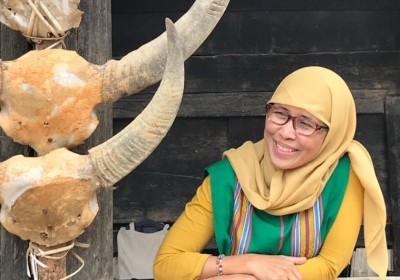PEKKA: Women Head Families Are Poor Due to Stigma
May 25, 2018
Director of Women Empowerment Head of Family (PEKKA) Nani Zulminarni. Private document
Muhae is a 29-year-old widow from Dasan Geres Village, Gerung District, West Lombok, West Nusa Tenggara. Her ex-husband married another woman and left with no news whatsoever. Since then, she had to make her own living, taking care of the house, and raising her children who were about to start schooling.
Although her life was difficult and she just did whatever trivial jobs she found, Muhae still managed to provide support to other community members. She would help villagers obtain Family Cards and ID cards. Where she lived, many elderly people did not have legal identity. They were assisted by Muhae, without expecting anything in return. That was when Muhae was offered to become a field data collector by BPS (Indonesian National Central Bureau of Statistics).
Muhae's duties include recording the low income people’s data by visiting them one by one and checking their personal documents from identity cards to social protection cards, provided both by the central and regional government. When doing her duties, Muhae found out that there were many poor families who never received any assistance. If other hamlets only managed to add five more families to the list of beneficiaries, Muhae included 30 families from her hamlet.
"If you do not trust me, just go to the village and check directly with the community," said Muhae as quoted from the 2015 Pekka Annual Report.
One of Muhae's neighbors said she was chosen because she was always very meticulous when collecting data. She would not include her wealthy brother and recommended him to be provided with the assistance card. From what she earned doing this job, Muhae managed to raise a capital to open a grocery store.
The story of Muhae is one example who a woman who has to support her family as the main bread winner should be involved in effort to overcome poverty and economic inequality. According to Director of PEKKA (an initiative to Empower women who are head of the family) women head of the family are still treated as object in development.
Nani said it is important for the government to make women heads of households as the subject of development because they are one of the elements in the poverty crust. Based on PEKKA research, one of four families in Indonesia is headed by a woman. And as many as 70 percent of women headed households are in poverty. It can be concluded that the majority of poverty in Indonesia comes from families whose burden is borne by women.
“If the government wants to solve the problem of poverty, this group should be optimally managed through the affirmation approach," said Nani in a meeting mid-May.
There are two affirmative policies regarding women heads of household. First, Nani said, they should be organized through special programs that are responsive to their needs. This can be the economic empowerment programs, the legal identity programs, or various trainings.
Second, they should be protected when carrying out all their economic activities. For example, the market where they conduct their economic activities should be protected so bigger competitors cannot penetrate. Women heads of households should also be provided with easy access to health coverage, financing, legal identity, etc.
The lack of access which is the common challenge faced by women heads of households must be addressed. One way to overcome disparities between regions and between individuals is through the organization of Indonesia Development Forum 2018 which has opted for the topic: 'Pathways to Tackle Regional Disparities Across the Archipelago'. The forum is a joint effort initiated by Bappenas and supported by the Australian Government through the Knowledge Sector Initiative (KSI) which aims to find solutions through science-based development policies, experiences and facts.
Stereotypes of Family Heads
There are seven categories of women heads of households based on the definitions made by PEKKA. The categories include widows, divorced women, wives left by their husbands, unmarried single mothers, wives whose husbands are sick and unable to work, or women with husband’s incompetent of supporting the family and daughters who have to be main bread winner. Most of these women are not listed as family heads in the family card despite being the main bread winner.
With the promulgation of the 2006 Population Administration Act, women can be legally and formally referred to as head of a family. Women can obtain their own family card without having to join their parents or ex-husbands so they can access the basic services provided by the government. However, culturally, women heads of households are still not properly recognized in the society.
"They are not invited to RT meetings or village meetings because the society mostly believe that the head of the family must be male," said Nani.
As a result, many decisions in society do not accommodate women’s perspective. These women have multiple burdens to carry on their own, as they have to earn a living and bring up their children. Even in eastern Indonesia, said Nani, many women have to continue providing care for their husband's relatives even though she was left with not enough money. What is worse, they are often labelled with a bad stigma by the community.
“There is this negative stigma about widows or single unmarried women of mature age, while actually they are the ones who support the family," said Nani.
That is why, Nani hopes that there will be collaboration between the government, community leaders to establish a cultural social system that can help reduce poverty among women heads of households. ***
Indonesia’s Research Institutions Supporting the Development of the Electric Vehicle Industry
Indonesian Muslim Fashion and Cosmetics IKMs Shine at Dubai World Expo 2020
Govt Steps Up UMKM Transformation Efforts in the Midst of Pandemic Slowdown
Govt Encourages Promotion of IKM Products in Digital Era
Government Begins Developing Maritime Training Center in Makassar
Tweets by IDDevForum
